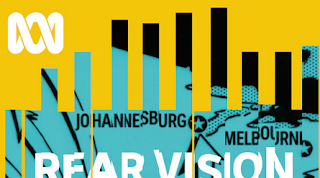Today's news is indistinguishable from misinformation and disinformation. Even when the news is accurately reported and factually correct, the media never bothers to analyze what it means and could mean in the future. It's like our minds are erased every 24-hour news cycle.
As usual, podcasting to the rescue. In this case, it's the Rear Vision podcast by ABC Radio. The show's tagline is "How history Shaped Today."
The people at ABC Radio explain: "Move beyond the headlines to see how the past defines our world. Whether it's a local or international story, Rear Vision's expert analysis gives you the background you need to understand today's news."
What does Rear Vision cover? Recent episodes include a show about the disputed region of Kashmir, a mountainous region bordering India and Pakistan. The Pakistanis will tell you that Kashmir is in the northeast corner of Pakistan, and the Indians will tell you that it is in the northwest corner of India.
Another episode examined U.S. President Trump's weird obsession with incorporating Canada as the 51st state, even though Canada is a sovereign
nation.
Each episode is 29 minutes, produced by Jennifer Leake, and the tone is reflective, analytical, and thoughtful.
The tone is driven by the show's host, Annabelle Quince, who has forged a varied career in the legal profession (as a researcher and lecturer), film and television (as a director, producer, scriptwriter, and researcher), and radio (as a producer and presenter).
Having completed a degree at Sydney's Macquarie University in 1981 majoring in psychology and history, Annabelle continued her education with a part-time law degree. Halfway through her studies, she received a chance offer to work in film as a researcher for a documentary — a stroke of fortune that led eventually to a full-time career in broadcasting.
After completing her law degree in 1987, Annabelle began a career as a lawyer, working with judges from the New South Wales Court of Appeal. However, after further work as a researcher and production assistant in film, she decided to pursue her alternative career.
From 1989 to 1995 she worked in radio and television in Australia and Britain. She was a researcher and producer for both BBC Television and Channel 4 (UK), while also establishing herself in radio, producing several feature length documentaries for RN, BBC Radio and Canadian Radio.
In 1995 she joined the team at RN's Late Night Live program, first as a producer and later as executive producer. During her 10 years with Late Night Live she produced a number of series with Phillip Adams including the India series 'A Billion Voices' and a series from New York. His recent 'The River' series, recorded along the Murray River, was awarded the United Nations 2005 Environmental Award.
Her legal background has emerged at various times in her broadcasting career. In 2000, she took a year's leave to produce and direct the documentary Watching the Detective, a film about women private investigators. On her return to RN in 2001 she produced the 'Crime Time' series for the Big Ideas program, which explored the points of connection between crime and popular culture.
In 2005, Annabelle devised, produced, and presented Rear Vision, a pilot series that examined the historical context of current events in the news. The series was deemed a success, and in 2006, Rear Vision became a regular weekly program on RN.
Rear Vision is produced by ABC Radio National, which has been a beacon for curious minds — where Australia's
biggest conversations find their voice and where audiences can go beyond
the news headlines for stories with national and global implications.
ABC Radio National shares Australia's best conversations across diverse topics, including arts and culture, business and current affairs, health, science and technology, Indigenous culture and issues, and religion and ethics.
For Americans, Rear Vision can provide news and analysis that's not tainted by the stain of confirmation bias, where Fox News and its copycats palm off opinion and right-wing talking points as news. After all, 90 percent of Fox News is in the entertainment division for a reason. Moreover, locked in the U.S. echo chamber, it's refreshing to hear the perspective from others around the world.
Rear Vision can help us to understand the history behind current events. The show lets us move beyond the headlines to see how the past defines our world. News analysis involves examining and interpreting news content to understand events, trends, and implications. It goes beyond basic reporting by providing context, background information, and deeper insights into the news. This
type of journalism aims to explain the "why" and "how" behind events,
offering a more comprehensive understanding than straightforward news
reporting.
We desperately need this.



Comments
Post a Comment
Thank You for your input and feedback. If you requested a response, we will do so as soon as possible.